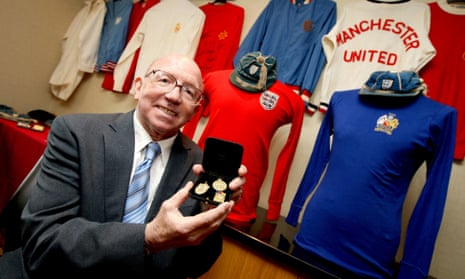The Professional Footballers’ Association has defended its response to the growing number of former players now suffering from dementia, after criticism that the union, clubs and Football Association are not doing enough to help them.
John Bramhall, the PFA’s deputy chief executive, said that, when the union is made aware of a former player in need, it tries to provide support “wherever we can”. However the cost of full-time residential care, which some players with advanced dementia require, is beyond its resources from its funding, principally by the Premier League, and it is not clear that the game is responsible for providing such facilities.
A growing campaign to have dementia in footballers recognised as a long-term effect of heading a ball has been led by the daughters of Jeff Astle, the former West Bromwich Albion striker of the 1960s and 70s, who died of dementia aged 59 in January 2002. Four of the surviving team members from England’s 1966 World Cup winners are now reported to be suffering from dementia or memory loss, including the former Manchester United midfielder Nobby Stiles. He sold his football medals to pay for the necessary care, which is now full-time, his son Rob Stiles said.
The coroner at the inquest into Astle’s death, Andrew Haigh, concluded on expert medical evidence that heading a heavy football for years professionally probably contributed to the trauma Astle’s brain sustained, and he recorded a verdict of “death by industrial disease”.
Astle’s daughters, Dawn and Claire, believed the inquest verdict was a groundbreaking determination that would lead to an acceptance of responsibility by the football authorities but a clear link between heading a ball and later dementia has not yet been established by research.
Dawn Astle has criticised the PFA and FA for the length of time taken to publish research commissioned after the inquest, which followed a group of young players and did not report until last May, in the medical journal Brain Injury. It concluded there was: “No significant neurological, structural brain imaging or neuropsychological change among a sample of young elite professional footballers over the first five years of their professional career.”
The concern about the long-term effects of heading the ball was reignited this week with the publication of results from post-mortems on six former footballers, whose researchers concluded there was a “potential link between repetitive sub-concussive head impacts from playing football and the development of [the degenerative brain disease] chronic traumatic encephalopathy”. The researchers acknowledged the small sample and limited nature of the study and called for wider and larger inquiries to be undertaken.
The FA and PFA, in collaboration with both the Premier and Football Leagues, have now jointly committed to funding new research into the issue, which will inform whether safety measures should be taken for footballers now. That will inevitably take time, while the number of players suffering is growing and said by some experts to be disproportionately high compared with the incidence of dementia in the general population.
Dawn Astle said she does not believe enough support is being given: “The PFA’s whole purpose is to look after former players but what have they done in 15 years since Dad died?”
Bramhall said research is needed to determine if there is a link with heading a ball and that the PFA does provide support for former players suffering from medical and physical ailments. The Premier League funds the PFA with a proportion of TV money, £19m last year, to facilitate a range of work including benevolent support. The union’s annual return shows that last year it spent £1.5m on medical fees and grants to individuals. “If we are made aware somebody is in need, we’ll give help wherever we can,” Bramhall said. “We will always be challenged on what we do and whether it is enough but I do think that what we do provide is of massive benefit to the former players.”
